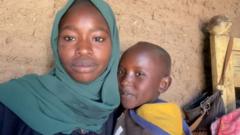Amidst escalating political tensions in Zimbabwe, a national protest against President Emmerson Mnangagwa's leadership has led to an unprecedented shutdown. While intended to challenge the president amid allegations of corruption and autocratic rule, low participation has caused alarm within activist circles.
Zimbabwe in Turmoil: Citizens Stay Home Amid Protest Push for President's Resignation

Zimbabwe in Turmoil: Citizens Stay Home Amid Protest Push for President's Resignation
Calls for President Mnangagwa's resignation lead to shutdown as citizens avoid streets due to heavy security presence.
In a tense atmosphere, Zimbabweans exhibited a decided reluctance to take to the streets during a scheduled protest orchestrated by disillusioned war veterans. As a heavy police presence loomed, many opted to remain indoors, responding to violence against a handful of protesters with general withdrawal. Protest leader Blessed Geza urged citizens via social media to overcome their fears and join the movement. Geza, who favors Vice-President Constantine Chiwenga as a successor to Mnangagwa, previously encouraged large crowds to descend upon the streets demanding change.
Violence was reported as police utilized teargas to disperse demonstrators at the President Robert Mugabe Square in Harare. Witnesses documented the chaotic scenes, capturing the police's efforts to break up what had been described as a "peaceful protest." The unrest stemmed from fears that Mnangagwa intends to prolong his tenure, exacerbating public dissatisfaction.
Political commentators suggest that while the social media buzz may imply disengagement, the critical shutdown reflects a deep-rooted political statement. Across multiple cities, everyday life remained disrupted; shops remained closed, schools canceled classes, and public transportation was all but non-existent as residents remained cautious.
In contrast, the government dismissed concerns over the protest's turnout, claiming it did not mirror reality. Church leaders urged restraint amid rising tensions, warning the general populace against the risk of civil unrest. Meanwhile, the public remains skeptical of Mnangagwa's assurances to step down in 2028, with fears lingering over attempts to extend his presidency beyond the constitutional limit.
The movement, stoked by Geza—a veteran war figure—has been characterized by fervent rhetoric aimed at president Mnangagwa, calling for his immediate ousting. In this volatile political landscape, the shadow of continued instability looms large over the nation's future.
Violence was reported as police utilized teargas to disperse demonstrators at the President Robert Mugabe Square in Harare. Witnesses documented the chaotic scenes, capturing the police's efforts to break up what had been described as a "peaceful protest." The unrest stemmed from fears that Mnangagwa intends to prolong his tenure, exacerbating public dissatisfaction.
Political commentators suggest that while the social media buzz may imply disengagement, the critical shutdown reflects a deep-rooted political statement. Across multiple cities, everyday life remained disrupted; shops remained closed, schools canceled classes, and public transportation was all but non-existent as residents remained cautious.
In contrast, the government dismissed concerns over the protest's turnout, claiming it did not mirror reality. Church leaders urged restraint amid rising tensions, warning the general populace against the risk of civil unrest. Meanwhile, the public remains skeptical of Mnangagwa's assurances to step down in 2028, with fears lingering over attempts to extend his presidency beyond the constitutional limit.
The movement, stoked by Geza—a veteran war figure—has been characterized by fervent rhetoric aimed at president Mnangagwa, calling for his immediate ousting. In this volatile political landscape, the shadow of continued instability looms large over the nation's future.



















